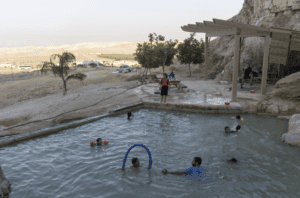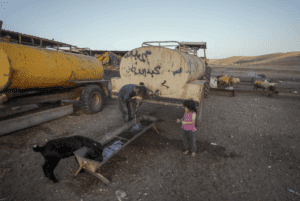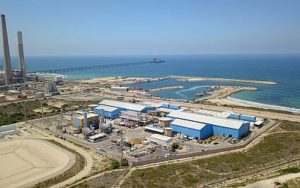By Kathryn Shihadah: About 300,000 Palestinians live in Area C, the part of the Palestinian West Bank that is under full Israeli control, along with 400,000 Jewish land thieves. Because these 300,000 Palestinians are not Jewish, Israel feels no obligation to provide them with water (or electricity, or roads, or schools) – in fact, Israel’s water ministry goes out of its way to bypass Palestinian villages when laying pipe.
The incident in the viral video occurred in late July, just a few weeks after Jewish Israel’s national water company, Mekerot, had, without explanation, cut water quotas to the Palestinian cities of Bethlehem and Hebron. This is not a one-off, but a continuous experience for Palestinians as they deal with what can only be called “water apartheid.”
“Disaster Zone”
On average, Israelis consume an average of 247 liters (65 gallons) of water per person per day. Israeli settlers in the Jordan Valley use much more: 400-700 liters (105-185 gallons).
Meanwhile, Palestinians in the West Bank use about 82 liters (22 gallons) per person per day. Palestinians living in Area C, many of them herders or farmers by trade, have access to just 26 liters (about 7 gallons) per day.
The Associated Press reports that this amount “is so far below the World Health Organization’s minimum standard of 50-100 liters that [the area] is ranked as a disaster zone.”
This is by design: Israel decides how much water is allocated to each population group. Water apartheid is why the tiny settlement of Ro’i receives 431 liters per person per day, while the adjacent Bedouin village of Al-Hadidyah receives just 20 liters.
[NOTE: the settlement of Ro’i was created with Israel’s blessing by taking over some of the farmland belonging to the Palestinians in Al-Hadidyah. In a short time, Ro’i was connected to all utilities; Al-Hadidyah has never been connected.]
Recent reports by Amnesty International and Human Rights Watch (HRW) go into detail about Israel’s discriminatory practices.


Trying to cope with water apartheid
Water is a matter of survival in arid Palestinian regions. Temperatures can soar to 108 midday.
Palestinians have strategies for dealing with the water shortfall: catching rainwater in tanks or cisterns, buying water at exorbitant prices from private vendors, digging their own wells and springs.
But Israel is always one step ahead: soldiers and settlers often shoot holes in tanks; wells may be destroyed, or settlers may simply take over a well if they like it; springs may be filled in, or confiscated and turned into Jewish-only swimming and recreation areas.
Even the minuscule amounts of rainwater that Palestinians collect are watched and often sabotaged.
Since 2021, Israel has demolished about 160 “unauthorized” Palestinian reservoirs, wells, and even sewage systems.

In the Palestinian village of Masafer Yatta, where running water is unavailable, up to half of the family’s monthly expenses go toward water purchased from local tanker trucks. In settlements, the cost of water is about 1%.
Palestinian water truck drivers report being regularly harassed or ticketed by the Israeli military, or having their vehicles confiscated, and then paying a fine to get them back.
One Palestinian Bedouin told the Israeli newspaper Ha’aretz,
Last week, four sheep died because of the heat. The problem is that I’m not allowed to build them a larger shelter. If I build one, [Israel will] demolish it straight away.
Another villager told a similarly horrific story of Israeli government workers showing up with soldiers and laborers to destroy a family cistern. All 26,000 gallons were gone in a matter of minutes – water that was supposed to last the family and its herds the entire summer.
Only Jewish Israelis enjoy Israel’s “water superpower” status
While Israeli settlements – built illegally on land stolen from Palestinians – have all the water they need, some nearby Palestinian villages are unable to receive more than a trickle. A large reason for this goes back to the 1995 Oslo Accords, which legalized Israel’s water dominance over Palestinians.
This power dynamic (that is, a dynamic in which Israel has all the power, and the Palestinians have none) can be traced to the creation of the so-called Joint Water Committee (JWC).
Under the Accords, Israel was to have 80% of the water in the aquifer located mostly on Palestinian land, and Palestinians 20%; Israel retained veto power over all Palestinian proposals. This arrangement, which was supposed to last for 5 years, is still in place – although the situation on the ground has changed drastically. [NOTE: Read more about the Oslo Accords here.]
The Palestinian population has grown by 75% since 1995, but the amount of water Palestinians are allowed to extract from aquifers on their own land has remained static.

The Ashkelon desalination facility, one of the largest in the world, is one
In addition, Israel has become a “water superpower.” According to ReliefWeb (a humanitarian information service provided by the UN Office for the Coordination of Humanitarian Affairs – OCHA), “[Israel now has] an advanced, efficient water management system that is relatively impervious to the effects of droughts and climate change.”
The World Bank noted, following a period of observing JWC meetings,
The JWC does not function as a “joint” water resource governance institution because of fundamental asymmetries – of power, of capacity, of information, of interests – that prevent the development of a consensual approach to resolving water management conflicts.″
An observer…called ″the interaction between the two sides during the [JWC] meetings … an exercise in subjugation and humiliation.″
Water scarcity for Palestinians is not a climate change issue – it is a human rights issue, and it has been for a long time. One eloquent Palestinian advocate describes it this way:
Water scarcity in Palestine is not simply a physical phenomenon, but a crisis manufactured by the Israeli state to control Palestinian society and industry.
Assault on the natural environment has long been a tool employed by Israel in its ethnic cleansing, as reasserted by recently released historical documents which outline Israel’s reliance on the destruction of land and crops to drive Palestinians out of their homes.
The Associated Press quoted one expert recently as saying, “The main motivation for Israeli actions are not so much about water anymore but about politics” – a political and humanitarian travesty in which only non-Jews are dying of thirst.
Kathryn Shihadah is an editor and staff writer for If Americans Knew. She also blogs occasionally at Palestine Home.

No comments:
Post a Comment